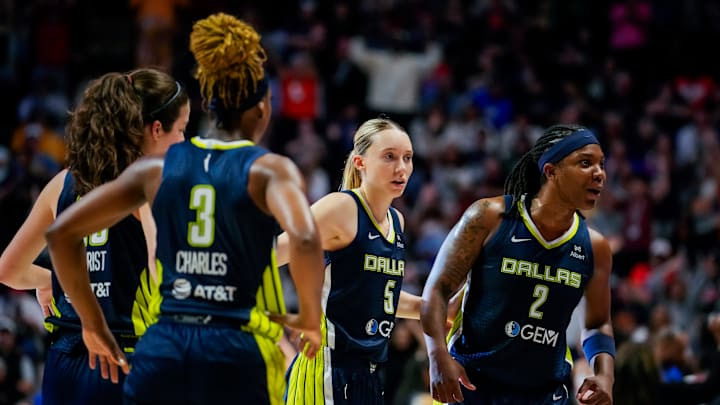The WNBA season is just two weeks old and the Dallas Wings are approaching rock bottom. On Thursday night, they handed the lowly Chicago Sky their first win of the season. That leaves the Wings at 1-5, and 11th in the standings. Their only win came over the still winless Connecticut Sun.
Pressure and frustration are mounting, and the issues start with the Wings talented backcourt — Arike Ogunbowale and No. 1 pick, Paige Bueckers.
On paper, the Wings' starting backcourt is the team's biggest strength. Ogunbowale is an established, prolific scorer, and Bueckers was the No. 1 pick for great reason. The two combined for 52 points and 15 assists in the loss to the Sky and still the focus after the game was on what's still not working between the two of them. Head coach Chris Koclanes put a positive spin on things:
"I thought you saw good rhythm, good chemistry. Especially that starting guard group, I thought you saw them really just kind of vibing out there and feeling it out with each other. I thought the ball moved, lots of assists again tonight. Encouraged by our play today on that side of the ball."
But Ogunbowale saw the glass as half empty, "It looked like our chemistry took a little step, but it's still not where we want it to be." Bueckers did not speak to the media after the game. You don't want to read too much into it, but she appeared frustrated during the game, and it seems like things could be pushing toward a breaking point.
Arike Ogunbowale and Paige Bueckers have not found a rhythm
Ogunbowale has always put up big point totals but struggled mightily with efficiency. She averaged 20.6 points per game over her first six seasons and attempted more shots than anyone else in the league. But she managed an effective field goal percentage of 46.4, one of the lowest marks in the league among high-volume scorers.
The conventional wisdom was that adding Bueckers would take some of the load off Ogunbowale, creating more easy opportunities for her and giving her a chance to avoid taking so many tough shots just because Dallas didn't have any other options.
But even with her big night against the Sky, Ogunbowale is shooting a career-low 31.3 percent from beyond the arc and her effective field goal percentage is just 44.7 percent, the lowest since her rookie season.
One problem is that she hasn't really taken a step back — her usage rate is almost identical to last season's. It's going to take adjusting for Ogunbowale to play off the ball more consistently, something she's never really had to do, but she hasn't shown much proclivity for it so far. And while it makes sense that Bueckers would have a lower usage rate because she does more facilitation, it's not a great sign that 3-and-D wing DiJonai Carrington also has a higher usage rate than Bueckers.
And as far a synergy between the two, there is still a long way to go. Bueckers has only connected with Ogunbowale for eight assists all season long, and five of them came against the Sky in their last game. Ogunbowale has only assisted Bueckers four times in five games.
Incredibly, the Wings offense hasn't been that bad, even with the disconnect between the two. They're currently fourth in offensive efficiency, ahead of teams like the Fever, Aces and Sparks. Their defense has been a complete mess — something that's always going to be a challenge with their flawed roster construction. Ogunbowale is a big net negative on defense, and Bueckers is a rookie, still learning the ropes at that end. Between their shortcomings and a messy frontcourt rotation, the only way this team is going to consistently win games is if their offense is overwhelmingly good.
They have the talent to get there — last night's game was clearly a step in the right direction. But until Bueckers and Ogunbowale are able to find a more symbiotic relationship — probably with more primacy for one and a lot less for the other — they're going to keep running into the same problems.
